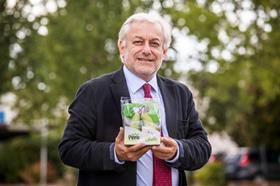
Pear sales are above expectations, stocks are running low, average prices are recovering: all in all it’s been a good start for the young Italian pear consortium PeraItalia as it rolls out a number of promotional initiatives worldwide.
PeraItalia was created in 2013 to promote consumption of quality Italian pears, particularly from the region of Emilia-Romagna.
The group’s nine members – Unacoa, Spreafico, Granfrutta Zani, Naturitalia, Patfrut, Orogel Fresco, Pempacorer, Opera and Bergonzoni – together represent 100,000 tonnes of fresh pears and around 12 per cent of the country’s total pear production, as well as a quarter of its Abate Fetel crop.
Luciano Torreggiani, president of the PeraItalia consortium, believes a complicated start to this year’s campaign will be followed by a more promising second half.
“Effectively we started with very low prices for Abate. Despite the product’s excellent quality, a slowdown in consumption meant that pressure on prices from the Italian and international retailers was very strong,” he explains. “But from mid-October the situation changed and by mid-November PeraItalia was registering sales that were above the forecast.”
The group’s members have apparently now sold more than 35 per cent of the total volume available for all varieties.
“Product not in storage is running out and we are starting to see average prices in the market recover. We are more optimistic about prices during the second half of the season when we think a rebalancing of demand and supply will lead to a higher, more satisfactory price level for our Abate.”
On various markets, PeraItalia has established promotional projects that focus primarily on tackling and repositioning the pear’s old-fashioned image.
To this end, new twin- and three-packs have been rolled out to a total of eight retail chains in Italy as well as a number of others in Europe.
“We are satisfied with the first results of these new offers,” comments Torreggiani. “With the new packagig, we want to highlight the Abate’s average size, which has always been an Achilles’ heel for the crop in terms of income. The new packs help to secure a better margin than for traditional packs normally used for this type of product, such as punnets and trays.
“In the second part of the campaign, we will also carry out a test on innovative packaging developed by the consortium for bulk product which will complete the PeraItalia-branded range. Working with bulk product and different sizes, we expect to achieve equally good results.”
Export markets
Outside of the EU, PeraItalia had been aiming at Russia, North America and the Middle East. Due to the Russian ban, however, the remaining two overseas markets have become even more important.
The consortium is working to send the first containers of Abate pears to Los Angeles in the US, for example, something which may lead to the development of more regular business in future.
The variety will be promoted in stores and, as consumers get to know it better, decisions will be taken on whether or not to do more.
In the Middle East, meanwhile, good interest has reportedly been registered for Abate, particularly following the consortium’s participation at the World of Perishables trade fair in Dubai.
“In both areas,” Torreggiani continues, “we are aware that it’s a medium- to long-term path to reaping the rewards in years to come. But we believe we are creating the right conditions and these could represent important commercial outlets for our pear industry in years to come.”
“The closure of the Russian market because of the embargo remains a great regret. In terms of volume, that country could represent the market with the greatest potential in the short term. What to say? We must be aware of the fact we cannot export there this year and hope that despite Putin’s current position the situation is resolved as soon as possible.”
Future plans
The PeraItalia project was born in order to help producers by creating an aggregated commercial entity that could develop a marketing project that no single company was able to sustain.
“Having done very little or nothing for decades to market and promote awareness of the excellence of our pears,” Torreggiani says, “we need to be aware that securing a future for Emilia-Romagna’s pear industry – and Abate in particular – will mean working on more levels to regain profitability for growers.
'That means working to reduce costs by optimising the handling and packaging of less valuable fruit; adding value through innovative communication and sales methods for medium to large-sized product; and expanding commercial opportunities to reduce the pressure on traditional markets.”
He adds: “On our own, it’s obvious that we cannot achieve all of these objectives, but we want to stimulate others who will be able to join or follow a similar path.”
For PeraItalia therefore, 2014/15 is expected to be an important test that will show whether or not the project itself is sustainable and if the conditions for developing the marketing strategy laid out will be profitable.
The consortium’s members are meeting every two weeks to agree on commercial policies that will be applied to Italian and foreign customers.
Torreggiani explains: “Working together as a team like this we are all helping to overcome barriers that were once insurmountable. It’s about beating the basic conservatism of the agricultural world, its suspicion of change and new things.”



